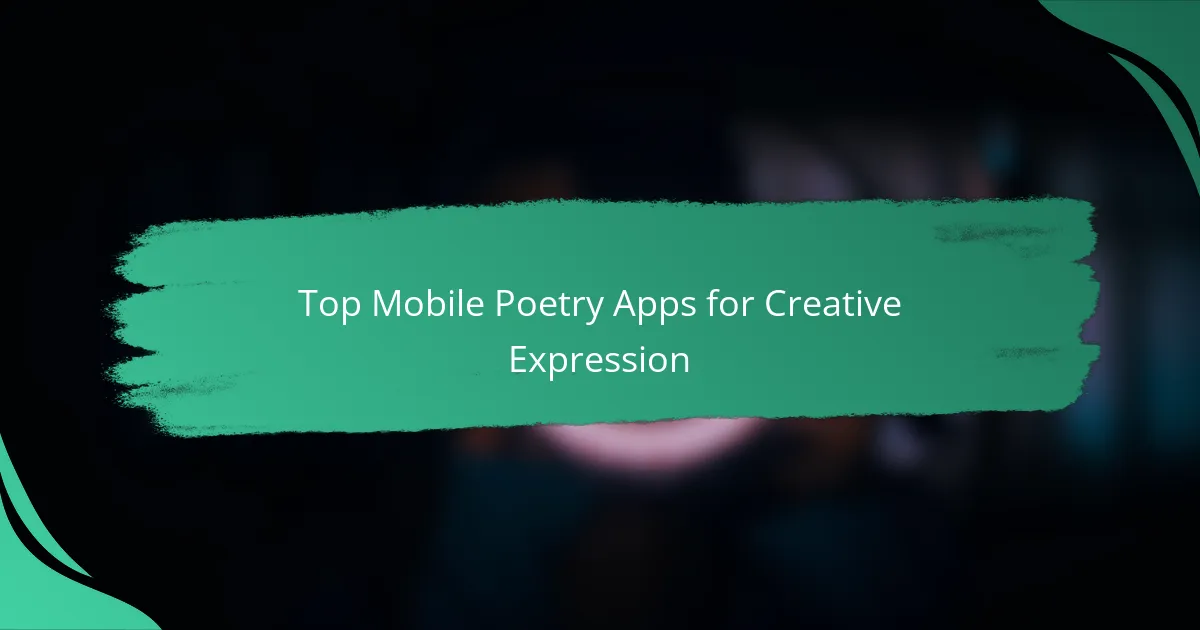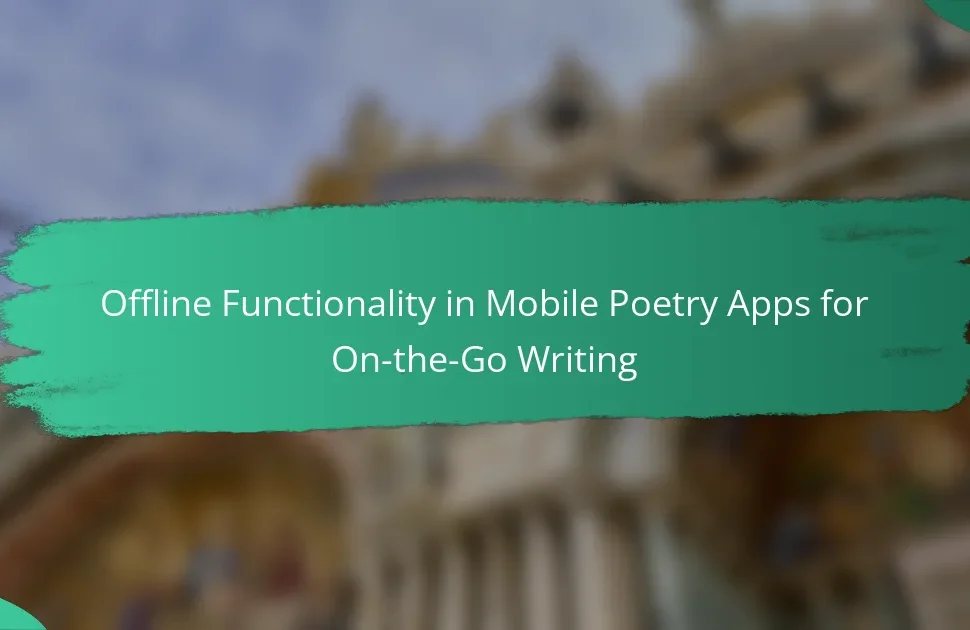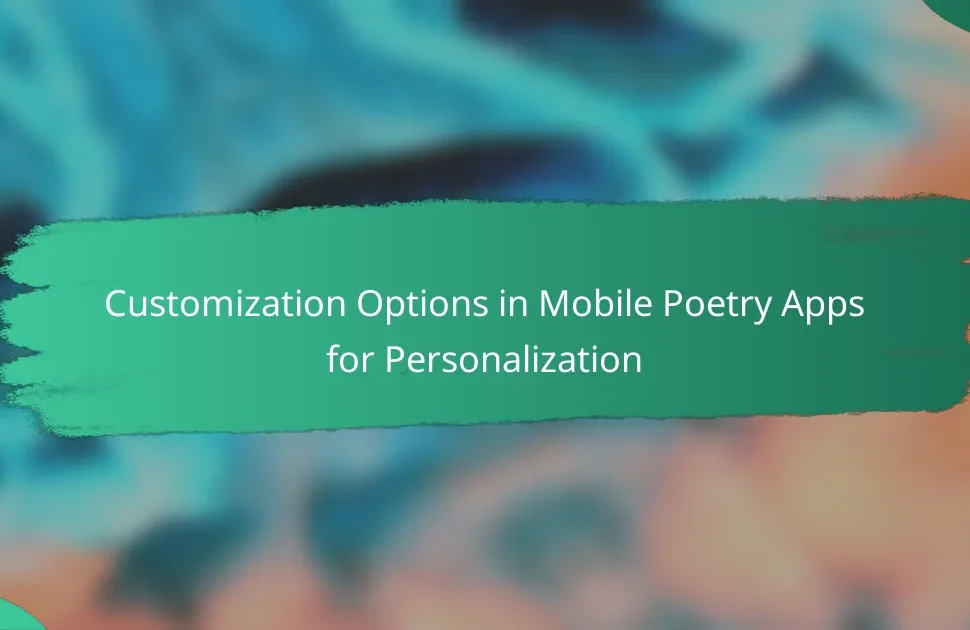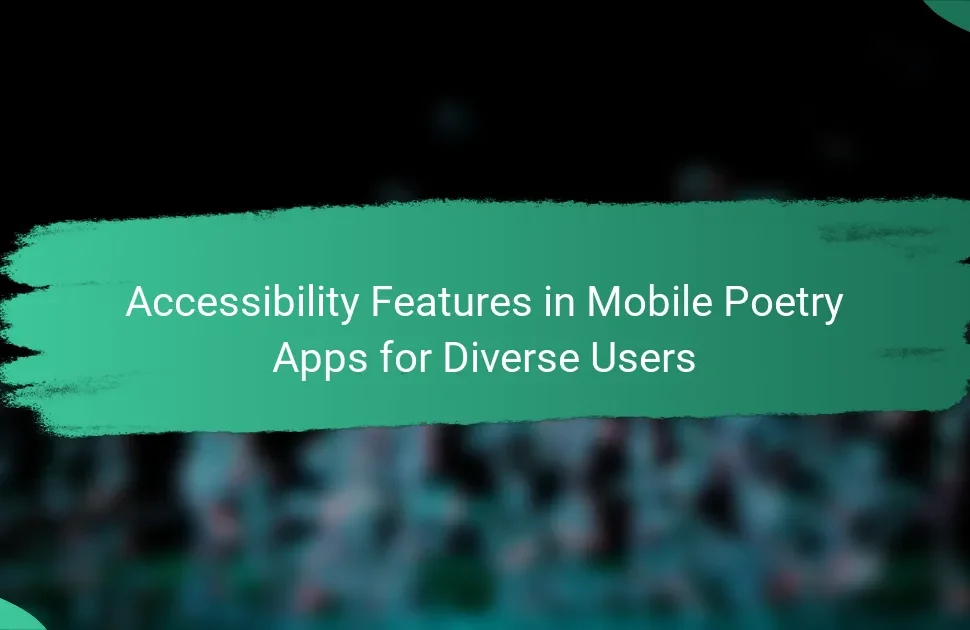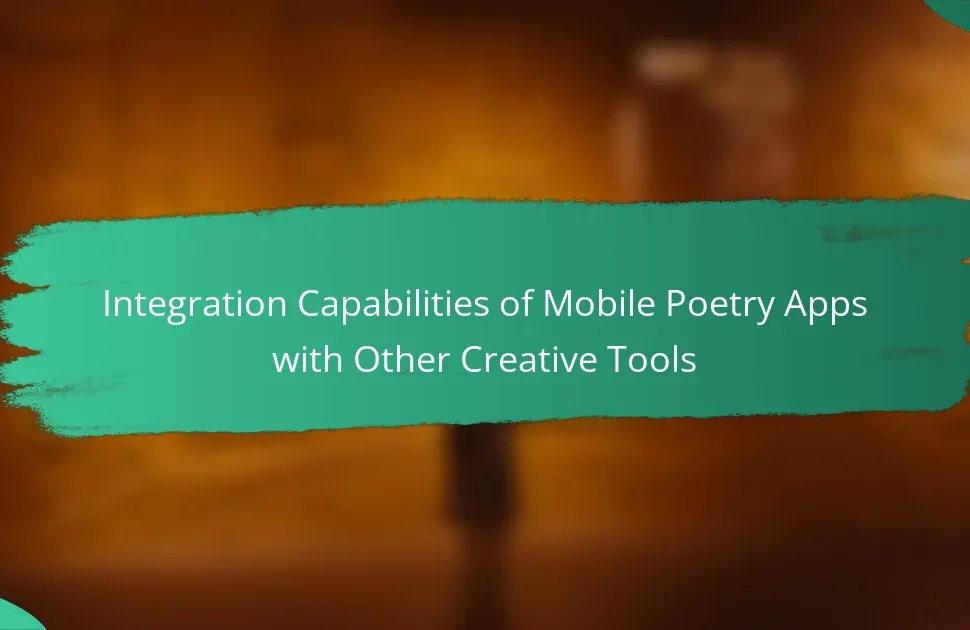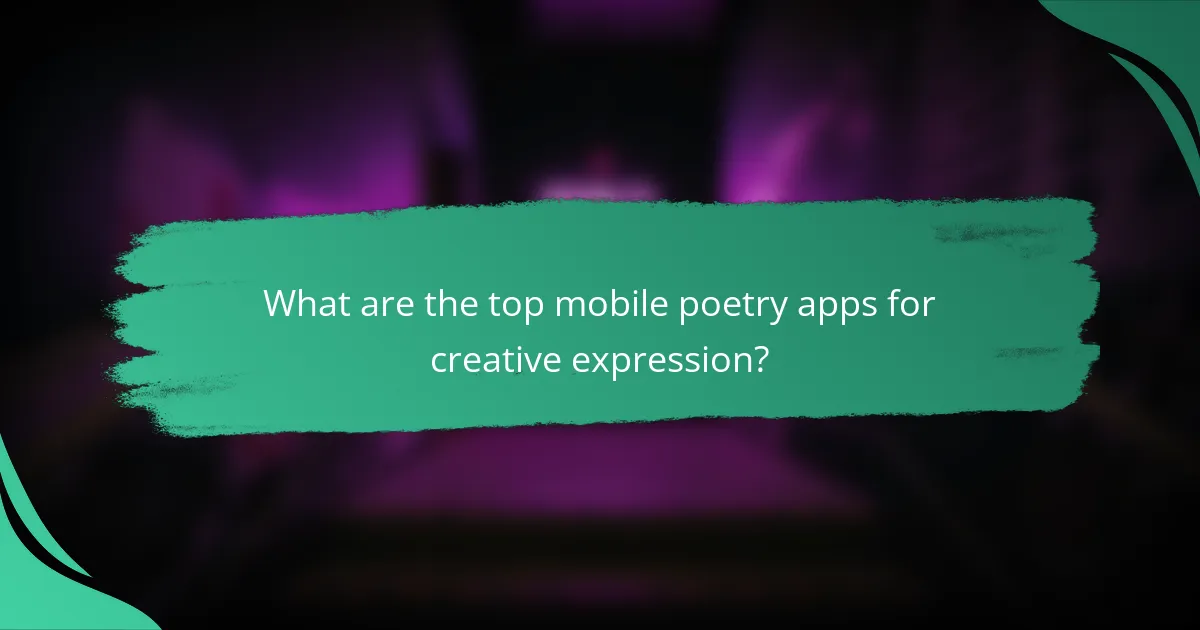
What are the top mobile poetry apps for creative expression?
The top mobile poetry apps for creative expression include Poetizer, Poet Assistant, and Verse. Poetizer allows users to share and discover poetry within a community. It features a simple interface and supports various poetry styles. Poet Assistant provides prompts and tools for writing poetry. It helps users structure their work effectively. Verse offers a platform for writing and organizing poetry. It includes features for sharing and receiving feedback. These apps cater to various aspects of poetry creation and sharing.
How do mobile poetry apps enhance creative writing?
Mobile poetry apps enhance creative writing by providing tools that foster inspiration and facilitate expression. These apps offer features such as prompts, rhyme dictionaries, and community sharing. Writers can access a vast library of poetic forms and styles. The ability to write and edit on-the-go encourages spontaneous creativity. Users can receive instant feedback from peers, enhancing their skills. Many apps include audio recording, allowing poets to explore sound and rhythm. Analytics tools help track writing progress and habits. Overall, mobile poetry apps create an engaging environment for writers to develop their craft.
What features make a mobile poetry app effective for writers?
An effective mobile poetry app for writers includes features like a user-friendly interface, customizable text formatting, and a built-in rhyming dictionary. A user-friendly interface allows for easy navigation and reduces distractions. Customizable text formatting helps writers experiment with different styles and layouts. A built-in rhyming dictionary assists in enhancing creativity by providing word options.
Additionally, the app should offer cloud storage for saving and accessing poems across devices. Collaboration tools enable writers to share their work and receive feedback from peers. Offline access is crucial for writing on the go without internet dependency. Lastly, prompts and writing exercises can inspire creativity and help overcome writer’s block.
How do user interfaces impact the creative process in poetry apps?
User interfaces significantly influence the creative process in poetry apps. A well-designed interface enhances user engagement and facilitates easier navigation. Intuitive layouts allow poets to focus on writing rather than struggling with the app’s functionality. Features like text formatting options and voice-to-text capabilities streamline the writing process. Research indicates that user-friendly designs can increase creativity by reducing cognitive load. For instance, a study by Nielsen Norman Group shows that users are more likely to explore creative features when interfaces are straightforward. Overall, effective user interfaces foster a conducive environment for poetic expression.
What are the key benefits of using mobile poetry apps?
Mobile poetry apps offer several key benefits. They provide accessibility to poetry creation and reading anytime and anywhere. Users can easily jot down ideas or full poems on their mobile devices. Many apps include features for editing and formatting poems, enhancing the writing process. Mobile poetry apps often foster a community for sharing and feedback. This interaction can inspire creativity and improve writing skills. Some apps also offer writing prompts to stimulate ideas. Additionally, they may include resources such as poetry guides and examples for learning. Overall, mobile poetry apps enhance the poetic experience through convenience and community engagement.
How do these apps foster a community among poets?
These apps foster a community among poets by providing platforms for sharing and collaboration. They enable users to publish their poetry and receive feedback from peers. This interaction encourages dialogue and connection among poets. Many apps include features like forums or discussion boards for deeper engagement. Additionally, social media integration allows poets to share their work beyond the app. Community challenges and contests promote participation and creativity. These elements create a supportive environment for poets to grow and learn from each other. Statistics show that apps with community features have higher user retention rates, indicating their effectiveness in building connections.
What role do mobile poetry apps play in improving writing skills?
Mobile poetry apps enhance writing skills by providing tools for practice and feedback. These apps often include prompts that inspire creativity. Users can experiment with different poetic forms and styles. Many apps feature community sharing options for peer feedback. This interaction helps writers refine their work. Additionally, some apps offer tutorials and resources for learning. These educational components support skill development. Overall, mobile poetry apps serve as accessible platforms for improving writing abilities.
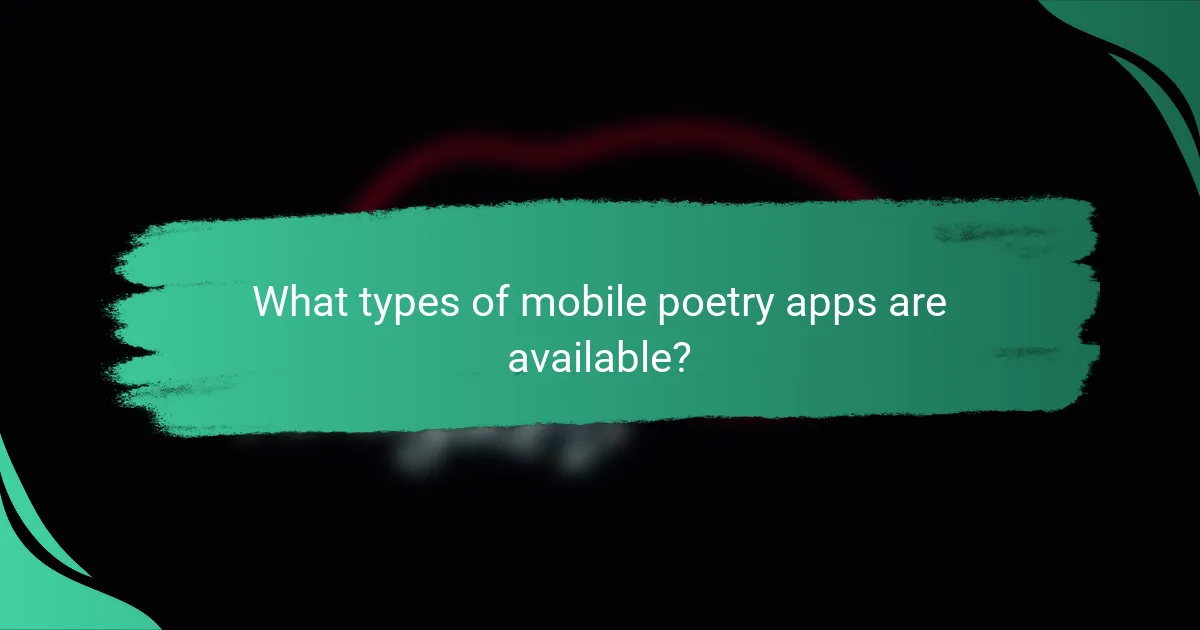
What types of mobile poetry apps are available?
There are several types of mobile poetry apps available. These apps can be categorized into writing tools, sharing platforms, and poetry generators. Writing tools assist users in composing and editing poetry. They often include features like rhyme suggestions and formatting options. Sharing platforms enable users to publish their poetry and connect with other poets. These platforms usually have community features for feedback and collaboration. Poetry generators create poems based on user input or themes. They provide a fun way to explore poetic styles and prompts. Popular examples of these types include Poetizer, Poet Assistant, and Instant Poetry. Each app serves a unique purpose in the poetry creation process.
What are the different categories of poetry apps?
The different categories of poetry apps include writing tools, poetry analysis apps, community platforms, and educational resources. Writing tools assist users in composing and editing poetry. Poetry analysis apps help users dissect and understand existing poems. Community platforms allow poets to share their work and receive feedback. Educational resources provide lessons and prompts for aspiring poets. Each category serves a unique purpose in enhancing the poetry experience for users.
How do writing and editing features vary among poetry apps?
Writing and editing features among poetry apps vary significantly. Some apps offer basic text editing tools, while others include advanced features like rhyme suggestions and syllable counters. For instance, apps like Poetizer allow collaboration and community feedback. In contrast, others like Evernote focus on note-taking with minimal poetry-specific tools. Certain apps provide formatting options for line breaks and stanzas, enhancing visual presentation. Additionally, some poetry apps incorporate audio recording features for spoken word poetry. Overall, the diversity in features caters to different user preferences and creative processes.
What unique tools do some poetry apps offer for inspiration?
Some poetry apps offer unique tools for inspiration such as writing prompts, rhyme generators, and collaborative features. Writing prompts help users overcome writer’s block by providing creative starting points. Rhyme generators assist in finding suitable words to enhance poetic flow. Collaborative features allow users to share their work and receive feedback from a community. Additionally, some apps include mood-based suggestions to tailor inspiration according to the user’s emotional state. These tools collectively foster creativity and encourage poetic expression.
What are the most popular mobile poetry apps currently?
The most popular mobile poetry apps currently include Poetizer, The Poetry App, and Poetry Foundation. Poetizer is a social network for poets, allowing users to share and discover poetry. The Poetry App offers a vast collection of classic and contemporary poems. Poetry Foundation provides access to a rich database of poems and poet biographies. These apps are widely recognized for their user-friendly interfaces and extensive poetry libraries.
What features set these top apps apart from others?
Top mobile poetry apps stand out due to their unique features. These features include user-friendly interfaces that enhance accessibility. Many apps offer customizable writing tools, allowing personalization of text appearance. Integration with social media platforms facilitates easy sharing of poetry. Some apps provide a collaborative writing environment for community engagement. Advanced editing options enable users to refine their work effectively. Additionally, features like prompts and inspiration boards help stimulate creativity. Analytics tools can track writing progress and engagement metrics.
How do user ratings and reviews reflect app quality?
User ratings and reviews serve as indicators of app quality. High ratings typically suggest user satisfaction and effective functionality. Conversely, low ratings often point to issues such as bugs or poor user experience. For instance, apps with an average rating below 3 stars frequently face criticism regarding performance. Research indicates that 79% of users trust online reviews as much as personal recommendations. Thus, user feedback directly influences potential users’ decisions. Furthermore, consistent positive reviews can enhance an app’s visibility in app stores.
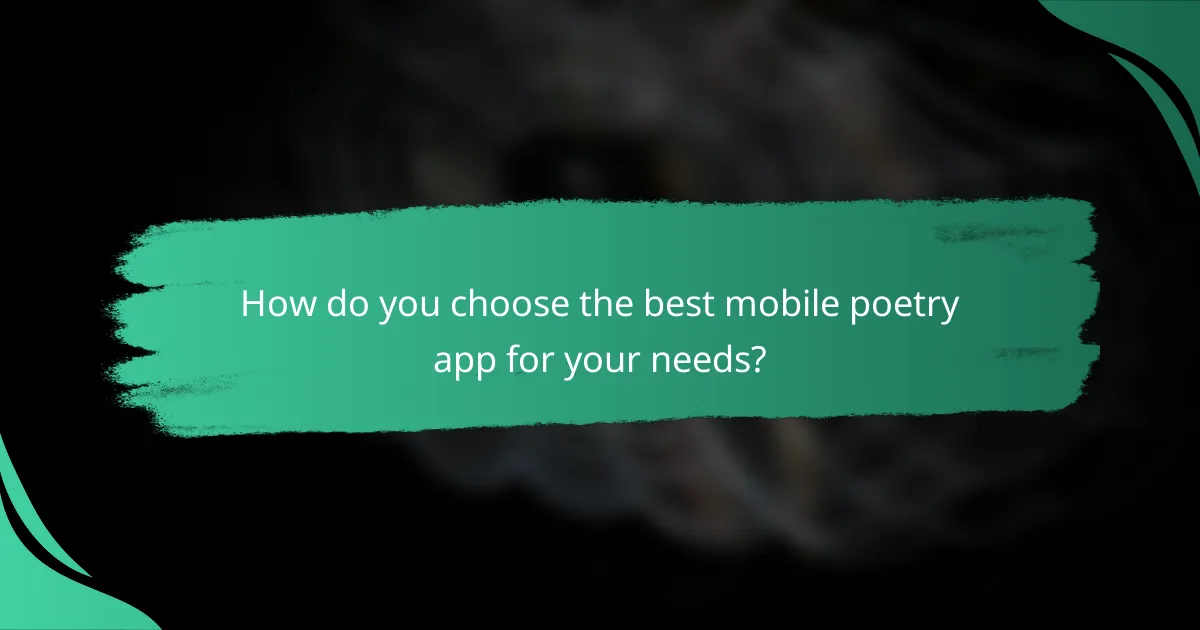
How do you choose the best mobile poetry app for your needs?
To choose the best mobile poetry app for your needs, assess your specific requirements. Consider the app’s features, such as writing tools and editing options. Evaluate user interface and ease of navigation. Check for community features like sharing and feedback options. Look for compatibility with your device’s operating system. Read user reviews to gauge overall satisfaction. Compare pricing models to ensure it fits your budget. Research popular apps such as Poetizer and Verse to see which aligns with your preferences.
What factors should you consider when selecting a poetry app?
When selecting a poetry app, consider user interface and ease of navigation. A clean design enhances user experience. Look for features such as writing tools and editing options. These tools facilitate creativity and improve poetry quality. Check for community features, such as sharing and feedback options. Engaging with other poets can provide valuable insights. Evaluate the app’s library of poetry resources. Access to inspiration can enhance your writing. Lastly, consider compatibility with devices. Ensure the app works seamlessly across platforms for convenience.
How does your writing style influence app choice?
Writing style significantly influences app choice by affecting user engagement and satisfaction. A clear, concise, and relatable writing style attracts users to poetry apps. Users prefer apps that present content in an accessible manner. Engaging writing styles enhance the overall user experience. For example, apps with user-friendly interfaces paired with relatable content retain users longer. Furthermore, research indicates that 70% of users abandon apps due to poor content presentation. Thus, effective writing styles can lead to increased app downloads and user retention.
What budget considerations are there for mobile poetry apps?
Budget considerations for mobile poetry apps include development costs, maintenance expenses, and marketing budgets. Development costs can vary widely based on features and platform compatibility. Basic apps may cost around $10,000 to $50,000 to develop. More complex apps with advanced functionalities can exceed $100,000.
Maintenance expenses are essential for updates and bug fixes. Annual maintenance can range from 15% to 20% of the initial development cost. Marketing budgets are crucial for user acquisition. Effective marketing can require an additional 20% to 30% of the total budget.
Additionally, monetization strategies impact the budget. Free apps may rely on ads or in-app purchases, while paid apps need to justify their price through unique features. Understanding these budget considerations helps in planning for successful mobile poetry app development.
What tips can enhance your experience with mobile poetry apps?
To enhance your experience with mobile poetry apps, explore various features and functionalities. First, utilize the app’s writing tools to experiment with different poetic forms. Many apps offer templates for sonnets, haikus, and free verse. Engage with the community sections to share your work and receive feedback. This interaction can inspire creativity and improve your craft.
Additionally, use the app’s organization features to categorize your poems by theme or style. This helps in tracking your progress and revisiting your best works. Customize notifications to stay updated on community events or writing prompts. Follow poets whose work resonates with you for inspiration and motivation.
Lastly, take advantage of any multimedia options available. Some apps allow you to incorporate audio or visual elements, enriching your poetry experience. By actively engaging with these features, you can significantly enhance your creative expression through mobile poetry apps.
How can you effectively use the features of your chosen app?
To effectively use the features of your chosen poetry app, familiarize yourself with its interface and tools. Explore the writing features, such as text formatting and rhyme suggestions. Utilize any built-in prompts or themes to inspire creativity. Take advantage of sharing options to receive feedback from peers. Use organizational tools to categorize your poems for easy access. Check for community features to connect with other poets. Regularly update your app to access the latest features and improvements. Following these steps enhances your creative expression through the app.
What common pitfalls should you avoid when using poetry apps?
Common pitfalls to avoid when using poetry apps include over-reliance on templates. Many users may feel constrained by predefined structures. This can stifle creativity and personal expression. Another pitfall is neglecting to edit and revise work. Initial drafts often require refinement for clarity and impact. Additionally, users should avoid ignoring community feedback. Engaging with other poets can enhance skills and provide valuable insights. Lastly, be cautious of excessive distractions from notifications. Constant alerts can interrupt the creative flow and focus needed for writing.
The main entity of the article is mobile poetry apps designed for creative expression. The article provides an overview of the top mobile poetry apps, such as Poetizer, Poet Assistant, and Verse, highlighting their features like community sharing, writing prompts, and editing tools. It discusses how these apps enhance creative writing by offering resources for inspiration and feedback, as well as the importance of user interfaces in facilitating the creative process. Additionally, the article categorizes different types of poetry apps and outlines key factors to consider when selecting the most suitable app for individual writing needs.
